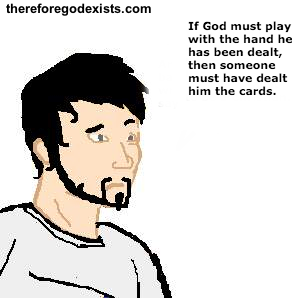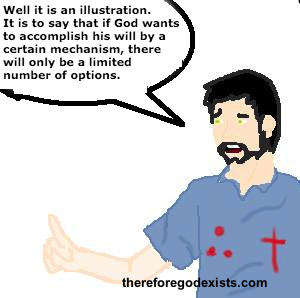Preface
Because I have critiqued Dr. White before, there are a few personal remarks I would like to make up front regarding my previous interactions.
On 12 May 2014, I published Philosophy Matters – James White Missing the Mark on Molinism. As I mentioned in the original post, I do like Dr. White. However, I realized that I didn’t consistently communicate that respect. For example, I made the comments
I highly doubt that White has delved deeply enough into “man’s philosophy” to know what kind of theory of truth he endorses.
It’s nice to see that Dr. White is addressing Molinism and giving it more attention. I find his criticisms intriguing albeit misguided and outdated. I am also happy to see him getting closer in accurately characterizing the actual tenets of Molinism. Ultimately, Dr. White’s rejection of Molinism is rooted in basic philosophical misunderstandings including ignorance of the responses to the grounding objection.
In his response on the 13 May 2014 edition of the Dividing Line, Dr. White commented on my first remark saying, “They gotta take the shots, don’t they?” Then remarked that his use of the terminology “man’s philosophy” is Pauline, justifying his use of it. The quote marks that I used were not my alluding to Paul’s letter to the Colossians; rather, they were scare quotes representing my frustration with people who misattribute the work of thoughtful Christian philosophers as such vanity. True, there may be some legitimate disagreement over what falls under Paul’s label. Nevertheless, it was rather snarky and I should not have made the quip. My second remark came across as condescending and rude enough for Dr. White to say, “Oh, sorry I’m not as smart as you”. For this, I sincerely apologize and will further strive to ensure my words are seasoned with salt.
Who Dealt God The Cards?
 Briefly, the “Card Dealer” terminology comes from an analogy Dr. William Lane Craig used in an article responding to the soteriological problem of evil (i.e. if God is good, why isn’t everyone saved?). Basically, God has to face the truth of the CCFs that confront Him and act within that framework i.e. “play with the hand He has been dealt” i.e. since God cannot change the truth value of what a creature would freely do in a circumstance. Dr. James White picked up on this and asked who determines the truth of the CCFs, for that is the god we should be worshipping i.e. “who deals the cards?” In the past, I have commented that Dr. Craig’s card analogy was bad and that Dr. White’s “card dealer” comment really just amounts to a rhetorical zinger. What do I mean to say that an analogy is “bad”? An analogy has two objectives: (1) create an accurate parallel between two or more different concepts and (2) make a complicated issue more easily understood. If an analogy does not have both components, then it is not a good analogy. After close examination, Dr. Craig’s analogy kind of meets criterion (1) by paralleling a particular subset of Molinism; however it is confusing and not analogy of Molinism in its entirety thus failing to meet criterion (2). Let us analyze these criteria in reverse.
Briefly, the “Card Dealer” terminology comes from an analogy Dr. William Lane Craig used in an article responding to the soteriological problem of evil (i.e. if God is good, why isn’t everyone saved?). Basically, God has to face the truth of the CCFs that confront Him and act within that framework i.e. “play with the hand He has been dealt” i.e. since God cannot change the truth value of what a creature would freely do in a circumstance. Dr. James White picked up on this and asked who determines the truth of the CCFs, for that is the god we should be worshipping i.e. “who deals the cards?” In the past, I have commented that Dr. Craig’s card analogy was bad and that Dr. White’s “card dealer” comment really just amounts to a rhetorical zinger. What do I mean to say that an analogy is “bad”? An analogy has two objectives: (1) create an accurate parallel between two or more different concepts and (2) make a complicated issue more easily understood. If an analogy does not have both components, then it is not a good analogy. After close examination, Dr. Craig’s analogy kind of meets criterion (1) by paralleling a particular subset of Molinism; however it is confusing and not analogy of Molinism in its entirety thus failing to meet criterion (2). Let us analyze these criteria in reverse.
Criterion of Confusion
Dr. Craig has infamously used another confusing analogy, this one in regards to one of the most profound divine revelations: that God is Trinity. In this analogy, Dr. Craig compares the idea of the Trinity to the pagan mythological three-headed dog Cerberus. Now, I have heard Dr. Craig’s analogy several times and after serious consideration and clarification, the analogy does indeed accurately parallel the Trinity; the conclusion is a single essence endowed with three faculties of mind. Nevertheless, it is as confusing as all get-out notwithstanding it is somewhat offensive. This is why I would never recommend using it.
Arguing against Cerberus does not engage the issue of the Trinity. Likewise, arguing against the “card dealer” does not engage the issue of Molinism. In a debate with Michael Brown, Dr. White made passing reference to the card dealer saying that Molinists believe in another god. Is Dr. White making a serious argument? If not, then the card dealer objection can rightly be categorized as serving a rhetorical value. If so, then Dr. White has some serious misunderstandings about Molinism. Personally, I think that it is a mixture of both rhetorical flourish and serious argument. The card-dealer comment by itself is only a rhetorical device but can be backed by a certain construal of the grounding objection.
Criterion of Comparison
Can Dr. Craig’s analogy be salvaged? Quite possibly. First, the issue is not that
- God cannot accomplish some outcome X
Rather, what is being said that
- God cannot accomplish some outcome X through a certain means
Once God commits Himself to a certain means of achieving His ends, He is limited by that decision. This does not seem at all controversial.
As a means of example, consider the resurrection of Christ. Can God raise Jesus from the dead? Of course; after all, that is what actually happened, so, it is clearly possible. Can God raise Jesus naturally from the dead? That is, can God in full compliance with the laws that govern chemistry, biology, and physics, etc. cause Jesus to be raised from the dead? Clearly the answer is no. Raising a person from the dead is practically by definition a miraculous event and simply cannot occur within the natural realm without some sort of divine superseding of the natural order. If God wants to providentially ensure that an event occurs naturally, He cannot operate outside of the laws of nature; He must play with His hand of “law cards”.
Let us apply this to the issue of free will and then consider an objection. Suppose that God wants to achieve an end and the means that He wants to use are the (libertarian) free choices of creatures. Just like He would need to operate within the laws of nature to bring about a natural event, likewise, God would need to operate within the (libertarian) free choices of creatures to bring about a free event. He must play with His hand of “freedom cards”. For God to force a person to freely make a choice or to causally determine an indeterminate outcome is just as incoherent as God naturally bringing about a supernatural event. It can be seen that with a proper parsing of the card dealing analogy, at root, Dr. Craig is simply saying that God cannot bring about a contradiction, which is not controversial. What is controversial is Dr. Craig’s application to the question “If God is morally perfect and all powerful, why isn’t everyone saved?”.
Can God achieve universalism through the (libertarian) free choices of creatures? Not if there are least some persons who would freely reject God in every circumstance. But can God achieve universalism at all? Let us return briefly to the question of Jesus’s resurrection. God could raise Jesus naturally from the dead if He would have created a world with different natural laws. It is perfectly within God’s freedom and right to create a world where people can rise from the dead naturally. But, just as He would have to create a completely different set of laws governing the natural order for this to occur, God would also have to create a completely different set of laws governing creaturely freedom to achieve universalism. If God had created the world where the creatures’ freedom was governed according to compatibilism, then, universalism could easily be obtained. God would merely install the desire to be saved in every human person.
With this background, we can see another angle to the card dealer objection. On Dr. Craig’s view, it can fairly be said that God is in somewhat of a bind. He gives prevenient grace to all persons, bringing them to a neutral point of decision for salvation. He wants everyone to freely accept, but, He knows that would never happen. So, He creates a world where on balance, there is more good than evil and the most people would choose to be saved. You could almost say that He wants a royal flush but settles for three of a kind. In any event, this is no longer an objection to Molinism en toto because this is an objection to Dr. Craig’s view of the doctrine of election. If one holds, as I do, to the view that God has a select group of individuals chosen before the foundation of the world, then no such bind presents itself.
The Grounding Objection
The card dealer objection appears, in part, to derive its strength from the grounding objection. The grounding objection essentially argues that the counterfactuals of creaturely freedom cannot be true because they are not grounded in anything. There is nothing in virtue of which these CCFs are made to be true. Can the Molinist offer a response?
In her dissertation The Grounding Objection, Jennifer Jensen surveys the issues behind the grounding objection and offers a promising analysis. While she admits that Molinists have work to do in order to formulate a comprehensive explanation for CCFs (after all this is cutting edge analytic philosophy), she posits that the Molinist is not left out to dry. To present a sufficient reply to the grounding objection, all the Molinist must do is demonstrate either (a) the proposed grounding principles can be reasonably rejected or (b) the CCFs can meet the criteria. Taking the card dealer objection at what I perceive to be face value, we can formulate a grounding principle along the lines of
(GP) all truths are directly and volitionally caused to be true by God
If this is true, God is not the ultimate truth-maker (as I erroneously posited before) but He is the truth causer, which is a considerably more radical claim. This grounding principle falls in the first category of being reasonably rejected. There are at least some truths that are impossible for God to volitionally change. These include “God exists” and “God is a Trinity” and “the angles in a Euclidean triangle sum to 180°”. These questions go to the very heart of the Biblical worldview; even the most presuppositional of all presuppositionalists cannot start with the Bible as an absolute epistemic starting point but must presuppose several properly basic beliefs. The clearest example is our own existence. If we are to learn anything about anything, we must first presuppose we exist. Another such example is the reliability of our cognitive faculties as well as sensory inputs. Before we read the Bible, we must first presuppose that our minds are somewhat functional and that what we see on the pages of the Bible is actually the content of Scripture. Another presupposition includes the laws of logic. Laws such as non-contradiction, identity, excluded middle, and others must be presupposed before we can approach the text of Scripture. If we do not presuppose these laws, then our theology can literally be anything that we want it to be. God can both be God and not-God. God can be unitarian and trinitarian. These laws are even used to distinguish theologies and other religions. Islam and Christianity cannot both be true at the same time and in the same sense. Calvinism and Open Theism cannot both be true. However, these realizations do not come from Scripture but from the philosophical presuppositions that are foundational for reasoning in any field theology or otherwise. Now, we know post de facto that our reasoning ability and our existence come from our being created in the image of God. We also know that the laws of logic, much like moral laws, are grounded in the being of God. So, theological truths ontologically precede these presuppositions but epistemically follow. In the nature of things, the theological truth of our being created in the image of God grounds our reasoning abilities and our philosophical presuppositions. However, we must use our philosophical presuppositions and reasoning abilities in order to come to know this theological truth. This does not appear to be controversial at all. In fact, it is a theological, revealed truth is that we can know things about God just by the creation alone, namely, His eternal power and divine nature (Romans 1:20). Of course, it goes without saying that we cannot know everything about God without Him speaking to us and directly revealing Himself as He has done in Scripture.
So to affirm (GP) is to descend into a world of lunacy. God can actualize logical contradictions and destroy any kind of reasoning. “God cannot lie” no longer becomes a starting axiom but a meaningless sentence. It seems quite apparent that the Christian must reject (GP). This is not to say that CCFs are grounded in the same way that these logical truths are grounded. The point of the argument thus far is simply to say that (GP) is falsified by the above referenced truths. An immediate response that comes to mind is to modify the principle to
(GP’) all contingent truths are directly and volitionally caused to be true by God
This sounds more plausible; however, it can also be reasonably rejected if we can produce at least one contingent truth that God cannot volitionally and directly cause to be true. I can think of two plausible candidates.
(T1) Evil exists
This meets the first criterion that it is contingent i.e. there is a possible world with no evil. Moreover, it seems that God cannot directly and volitionally cause evil to exist for He is all good and no darkness is within Him (1 John 1:5). Notice that this is not the same thing as permitting evil. Permitting and causing are not the same things in this respect. If God is permitting evil, then there is another agent whose actions God could have stopped but chose to allow to continue unimpeded. Another plausible truth is
(T2) some agent S is tempted
This is motivated by James 1:13 which states that God is not tempted by evil nor tempts people with evil. As James explains, temptations come about when one is carried or enticed by his own lust. Again, we have other agents involved wherein a contingent truth is brought about and God cannot directly and volitionally cause this truth. Notice again that this is not the same as God permitting someone to be tempted or bringing it about via secondary means. It is most likely the case that neither (GP) nor (GP’) are the grounding principles that Dr. White and other anti-Molinists have in mind. I will leave it to those persons to articulate their perspective. I fully accept that no anti-Molinist will find this type of response exhaustively satisfying. Nevertheless, this does provide a direction for future meaningful discussion past the card dealer.
About the Author
 Zachary Lawson is a biomedical engineering student at Texas A&M University. When he gets bored, he pretends to know something about philosophy, theology, and apologetics. He is the chapter president of Ratio Christi at Texas A&M (RC-TAMU.org), an occasional blogger (caplawson.wordpress.com), and a co-host on the Think Theism podcast (thinktheism.org).
Zachary Lawson is a biomedical engineering student at Texas A&M University. When he gets bored, he pretends to know something about philosophy, theology, and apologetics. He is the chapter president of Ratio Christi at Texas A&M (RC-TAMU.org), an occasional blogger (caplawson.wordpress.com), and a co-host on the Think Theism podcast (thinktheism.org).
Twitter: @zacharytlawson
All knowledge is God’s knowledge, including middle knowledge
— Zachary Lawson (@zacharytlawson) January 14, 2015